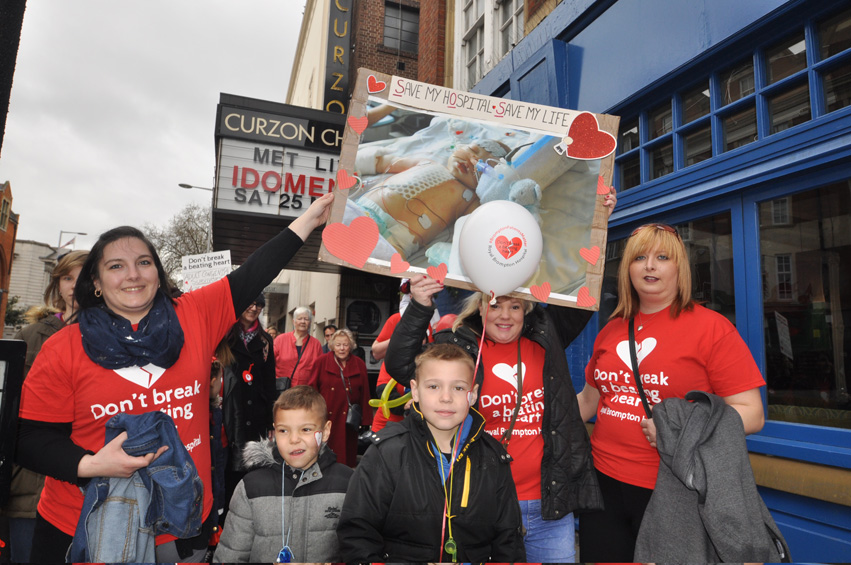
THE overwhelming of NHS hospitals by Covid patients in successive waves has led to a large reduction in care for heart patients, with consequent record deaths from heart disease during the pandemic.
This topic is discussed in the British Medical Journal (BMJ 7- 14 August 2021 ‘Re starting NHS cardiovascular care after the pandemic’).
It became apparent during the first wave of the pandemic in March and April 2020, that more people were dying of acute cardiovascular diseases than before, and that half of the additional deaths were happening in the community.
The Lancet journal published a study showing that there were approximately 5,000 fewer hospital admissions for acute coronary syndromes than would be expected during March 2020, which is 40% less than normal.
This led to the conclusion that patients were being prevented from accessing hospital care in the usual way.
One of the authors of the Lancet Study, Barbara Casadei, Professor of Cardiovascular Medicine at Oxford University, told the BMJ: ‘We found a decrease in admissions for acute coronary syndrome all over the country, irrespective of age and comorbidity, not just in frail patients and in areas with high rates of Covid-19.’
She suggested that the government’s message ‘Stay at home. Protect the NHS. Save lives’ may have influenced patients, but they may also have been influenced by fear of catching coronavirus by attending hospital.
Another factor leading to less hospital care for patients suffering acute heart conditions was that GP referrals to hospital were reduced. A Health Foundation analysis found that GP referrals for coronary artery disease dropped by 10%, and referrals for heart failure by 5%, in the period after the first lockdown.
In addition, there is evidence that much hospital treatment for heart disease was withdrawn, even for patients deemed a priority. An analysis by the Nuffield trust showed that patients’ hospital appointments for surgery, investigative procedures or follow-up reviews were simply cancelled.
Moreover, patients were finding it hard even to contact their GP, or 111.
A report by Public Health England looked at patients who died between 21 March 2020 to 26 February 2021, and found 5,800 excess deaths from disease of the heart or circulatory system. Coronavirus was only mentioned on half of the death certificates, suggesting that at least half of these patients died from the lack of the treatment and care they would normally have expected to receive for their cardiovascular conditions.
The colossal reduction in the levels of NHS care provided during the pandemic, is confirmed in a study by the British Heart Foundation comparing heart procedures and operations delivered in 2020 and 2019.
In 2020, 371,000 of these were performed, compared to 473,000 completed in 2019 – a 20% drop.
These treatments included procedures to open up blocked coronary arteries using stents and balloons, and trans catheter aortic valve implantation, as well as surgery for coronary artery bypass, heart valve disease, and congenital heart disease.
Simon Kendall, president of the Society of Cardiothoracic Surgeons, said that: ‘Basically heart surgery stopped for the month of April 2020.’ He said that there was catch-up in the summer and autumn, but that waiting lists were smaller because there were less referrals to GPs and cardiologists, and so the work done in 2020 was a third to half less than normal.
During January 2021, at the winter peak of the second wave, most heart surgery stopped again, with London, the North West and the Midlands being especially affected.
Kendall said: ‘We are expecting all the patients who didn’t come forward last year to come forward this year. There is a very significant amount of unmet demand that will become apparent in the coming years.’
According to NHS England, there were 241,181 patients waiting for heart procedures and operations by the end of May 2021, which is the highest May figure on record.
Kendall pointed out that even before the pandemic, cardiac operations were constantly being cancelled because of a shortage of level 3 intensive care unit beds, in which to provide the necessary post-operative care for such patients.
At the peaks of the different waves, many cardiac trained and theatre nurses were moved out of operating theatres to work on the Covid wards, meaning that there were not the staff to man the theatres, even had there been ICU beds or anaesthetists available.
The article refers to a new NHS Improvement programme report ‘Getting It Right First Time’ on cardiology, which suggests that cardiac services should be re-organised into ‘functional networks’, with a cardiac surgical centre at the apex. This is supposed to improve care quality by ‘reducing unwarranted variations’.
Given the steadfast refusal of NHSE to contemplate any increase in NHS beds or ICU beds over the last 10 years, and the failure of other ‘networks’ such as the cancer networks to have kept up with demand during the pandemic, these reform promises cannot be relied on to tackle the huge backlogs of care which have built up.
In fact, NHSE has pursued the opposite policy, of continuing to close NHS hospital beds and refusing to recruit sufficient NHS staff, as part of the NHS Long Term Plan.
The Health and Care Bill currently being railroaded through parliament opens up the huge new opportunities for private companies to provide NHS services for profit. Already, the newly appointed Secretary of State for Heath and Social Care, Sajid Javid, has said that the he will be looking at more private sector provision to address the huge waiting lists in the NHS.
To resolve the massive backlogs and restore timely high standard NHS care, only a workers’ government with socialist policies can recruit the staff and open up the facilities to restore comprehensive care free at the point of need.